|
|
|
|
 |
 |
 |
 |
Recommended Reading

I have listed here some recommended reading in a variety of topics. You may click on the picture to order the book on Amazon.com.
|
 |
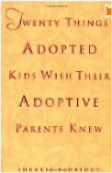 |
Topic: Adoption
 Eldridge, Sherrie, Twenty Things Adopted Kids Wish Their Adoptive Parents Knew, New York: Dell Publishing, 1999.
Eldridge, Sherrie, Twenty Things Adopted Kids Wish Their Adoptive Parents Knew, New York: Dell Publishing, 1999.
The voices of adopted children are poignant, questioning. And they tell a familiar story of loss, fear, and hope. This extraordinary book, written by a woman who was adopted herself, gives voice to children's unspoken concerns, and shows adoptive parents how to free their kids from feelings of fear, abandonment, and shame.
With warmth and candor, Eldridge reveals the twenty complex emotional issues you must understand to nurture the child you love--that he must grieve his loss now if he is to receive love fully in the future--that she needs honest information about her birth family no matter how painful the details may be--and that although he may choose to search for his birth family, he will always rely on you to be his parents. |
 |
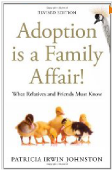 |
Topic: Adoption
 Irwin Johnson, Patricia, Adoption Is a Family Affair: What Relatives and Friends Must Know, London & Philadelphia: Perspectives Press, 2001, 2012.
Irwin Johnson, Patricia, Adoption Is a Family Affair: What Relatives and Friends Must Know, London & Philadelphia: Perspectives Press, 2001, 2012.
A child is coming - whether you approve or not it's time to get with the program! If someone you care about - a family member, co-worker, or close friend - has recently announced that their family will be growing through adoption, you may have questions. After all, unless you have personally experienced adoption, you may know very little about how adoption works and what it means. Are you worried that your loved one may face disappointment? Do you find yourself wondering exactly what your role is going to be in the child's life? Does the term "open adoption" confuse and concern you? Just what are the privacy boundaries for families built by adoption: what is okay to ask about? "Adoption Is a Family Affair!" will answer all of these questions and more, offering you information about who can adopt, why people consider adopting, how kids understand adoption as they grow up, and more. |
 |
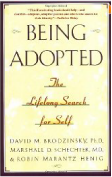 |
Topic: Adoption
 Brodzinsky, David M., Marshall D. Schecter & Robin Marantz Henig, Being Adopted: The Lifelong Search for Self, New York & Toronto, 1993.
Brodzinsky, David M., Marshall D. Schecter & Robin Marantz Henig, Being Adopted: The Lifelong Search for Self, New York & Toronto, 1993.Like Passages, this groundbreaking book uses the poignant, powerful voices of adoptees and adoptive parents to explore the experience of adoption and its lifelong effects. A major work, filled with astute analysis and moving truths.
|
 |
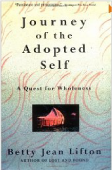 |
Topic: Adoption Lifton, Jean, Journey Of The Adopted Self: A Quest For Wholeness, New York, Basic Books, 1994. Lifton, Jean, Journey Of The Adopted Self: A Quest For Wholeness, New York, Basic Books, 1994.Betty Jean Lifton, whose Lost and Found has become a bible to adoptees and to those who would understand the adoption experience, explores further the inner world of the adopted person. She breaks new ground as she traces the adopted child’s lifelong struggle to form an authentic sense of self. And she shows how both the symbolic and the literal search for roots becomes a crucial part of the journey toward wholeness.
|
 |
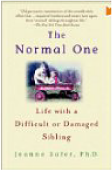 |
Topic: Children & Family
 Safer, Jeanne, The Normal One: Life with a Difficult or Damaged Sibling, New York: Bantam Dell, 2002.
Safer, Jeanne, The Normal One: Life with a Difficult or Damaged Sibling, New York: Bantam Dell, 2002.
Few bonds in our lives are as psychologically and emotionally significant as the ones we share with our sisters and brothers, although little has been written about this formative relationship. In this first-of-its-kind book, psychotherapist Jeanne Safer takes us into the hidden world of problem siblings and explores the far-reaching effects on the lives of those who are considered the “normal ones.”
Drawing on more than sixty interviews with normal, or intact, siblings, Safer explores the daunting challenges they face, and probes the complex feelings that can strain families and damage lives. A “normal” sibling herself, Safer chronicles her own life-shaping experiences with her troubled brother. She examines the double-edged reality of normal ones: how they both compensate for their siblings’ abnormality and feel guilty for their own health and success. With both wisdom and empathy, she delineates the “Caliban Syndrome,” a set of personality traits characteristic of higher-functioning siblings: premature maturity, compulsion to achieve, survivor guilt, and fear of contagion.
It is a profound and eye-opening examination of a subject that has too long been shrouded in darkness.
|
 |
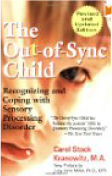 |
Topic: Children & Family
 Kranowitz, Carol, & Lucy Jane Miller, The Out-of-Sync Child: Recognizing and Coping with Sensory Processing Disorder, Revised Edition, New York: The Berkley Publishing Group, 2005.
Kranowitz, Carol, & Lucy Jane Miller, The Out-of-Sync Child: Recognizing and Coping with Sensory Processing Disorder, Revised Edition, New York: The Berkley Publishing Group, 2005.
The Out-of-Sync Child broke new ground by identifying Sensory Processing Disorder, a common but frequently misdiagnosed problem in which the central nervous system misinterprets messages from the senses. This newly revised edition features additional information from recent research on vision and hearing deficits, motor skill problems, nutrition and picky eaters, ADHA, autism, and other related disorders.
|
 |
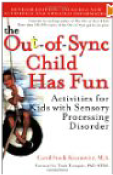 |
Topic: Children & Family
 Kranowitz, Carol, The Out-of-Sync Child Has Fun: Activities for Kids with Sensory Processing Disorder, Revised Edition, New York: Perigree Books, 2003.
Kranowitz, Carol, The Out-of-Sync Child Has Fun: Activities for Kids with Sensory Processing Disorder, Revised Edition, New York: Perigree Books, 2003.
The first accessible guide to examine Sensory Processing Disorder, The Out-of-Sync Child touched the hearts and lives of thousands of families. Carol Stock Kranowitz continues her significant work with this companion volume, which presents more than one hundred playful activities specially designed for kids with SPD.
Each activity in this inspiring and practical book is SAFE—Sensory-motor, Appropriate, Fun and Easy—to help develop and organize a child’s brain and body. Whether your child faces challenges with touch, balance, movement, body position, vision, hearing, smell, and taste, motor planning, or other sensory problems, this book presents lively and engaging ways to bring fun and play to everyday situations.
This revised edition includes new activities, along with updated information on which activities are most appropriate for children with coexisting conditions including Asperger’s and autism, and more. |
 |
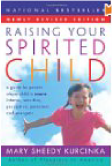 |
Topic: Children & Family
 Kurcinka, Mary Sheedy, Raising Your Spirited Child: A Guide for Parents Whose Child Is More Intense, Sensitive, Perceptive, Persistent, and Energetic, Revised Edition, New York: HarperCollins, 2006.
Kurcinka, Mary Sheedy, Raising Your Spirited Child: A Guide for Parents Whose Child Is More Intense, Sensitive, Perceptive, Persistent, and Energetic, Revised Edition, New York: HarperCollins, 2006.
Newly revised, featuring the most up-to-date research, effective strategies, and real-life stories, the spirited child, often called "difficult" or "strong-willed," possesses traits we value in adults yet find challenging in children. Research shows that spirited kids are wired to be "more" by temperament, they are more intense, sensitive, perceptive, persistent, and uncomfortable with change than the average child. In this revised edition of the award-winning classic, voted one of the top twenty books for parents, Kurcinka provides vivid examples and a refreshingly positive viewpoint. Raising Your Spirited Child will help you understand your child's—and your own—temperamental traits, discover the power of positive—rather than negative—labels, cope with the tantrums and power struggles when they do occur, plan for success with a simple four-step program, develop strategies for handling mealtimes, sibling rivalry, bedtimes, holidays, and school, among other situations. |
 |
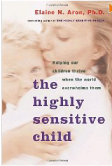 |
Topic: Children & Family
 Aron, Elaine N., The Highly Sensitive Child: Helping Our Children Thrive When the World Overwhelms Them, New York: Broadway Books, 2002.
Aron, Elaine N., The Highly Sensitive Child: Helping Our Children Thrive When the World Overwhelms Them, New York: Broadway Books, 2002.
The bestselling author and psychologist whose books have topped 240,000 copies in print now addresses the trait of “high sensitivity” in children–and offers a breakthrough parenting guidebook for highly sensitive children and their caregivers.
With the publication of The Highly Sensitive Person, Elaine Aron became the first person to identify the inborn trait of “high sensitivity” and to show how it affects the lives of those who possess it. Up to 20 percent of the population is born highly sensitive, and now in The Highly Sensitive Child, Aron shifts her focus to highly sensitive children, who share the same characteristics as highly sensitive adults and thus face unique challenges as they grow up.
Rooted in Aron’s years of experience as a psychotherapist and her original research on child temperament, The Highly Sensitive Child shows how HSCs are born deeply reflective, sensitive to the subtle, and easily overwhelmed. These qualities can make for smart, conscientious, creative children, but with the wrong parenting or schooling, they can become unusually shy or timid, or begin acting out. Few parents and teachers understand where this behavior comes from–and as a result, HSCs are often mislabeled as overly inhibited, fearful, or “fussy,”or classified as “problem children” (and in some cases, misdiagnosed with disorders such as Attention Deficit Disorder). But raised with proper understanding and care, HSCs are no more prone to these problems than nonsensitive children and can grow up to be happy, healthy, well-adjusted adults. |
 |
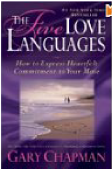 |
Topic: Relationships Chapman, Gary, The Five Love Languages: How to Express Heartfelt Commitment to Your Mate, Northfield Publishing; Gift edition, 1996.
Chapman, Gary, The Five Love Languages: How to Express Heartfelt Commitment to Your Mate, Northfield Publishing; Gift edition, 1996.
Unhappiness in marriage often has a simple root cause: we speak different love languages, believes Dr. Gary Chapman. While working as a marriage counselor for more than 30 years, he identified five love languages: Words of Affirmation, Quality Time, Receiving Gifts, Acts of Service, and Physical Touch. In a friendly, often humorous style, he unpacks each one. Some husbands or wives may crave focused attention; another needs regular praise. Gifts are highly important to one spouse, while another sees fixing a leaky faucet, ironing a shirt, or cooking a meal as filling their "love tank." Some partners might find physical touch makes them feel valued: holding hands, giving back rubs, and sexual contact. Chapman illustrates each love language with real-life examples from his counseling practice. |
 |
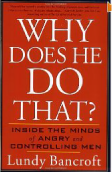 |
Topic: Relationships Bancroft, Lundy, Why Does He Do That?: Inside the Minds of Angry and Controlling Men, New York: Berkley Publishing Group, 2002.
Bancroft, Lundy, Why Does He Do That?: Inside the Minds of Angry and Controlling Men, New York: Berkley Publishing Group, 2002.
Women in abusive relationships tell themselves these things every day. Now they can see inside the minds of angry and controlling men-and change their own lives. In this groundbreaking book, a counselor shows how to improve, survive, or leave an abusive relationship, with the early warning signs, nine abusive personality types, how to tell if an abuser can change, is changing, or ever will, the role of drugs and alcohol, what can be fixed, and what can't, and how to leave a relationship safely.
|
 |
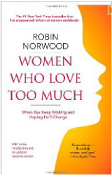 |
Topic: Relationships Norwood, Robin, Women Who Love Too Much: When You Keep Wishing and Hoping He'll Change, New York: Pocket Books, 1985.
Norwood, Robin, Women Who Love Too Much: When You Keep Wishing and Hoping He'll Change, New York: Pocket Books, 1985.
- Do you find yourself attracted again and again to troubled, distant, moody men -- while "nice guys" seem boring?
- Do you obsess over men who are emotionally unavailable, addicted to work, hobbies, alcohol, or other women?
- Do you neglect your friends and your own interests to be immediately available to him?
- Do you feel empty without him, even though being with him is torment?
Robin Norwood's groundbreaking work will enable you to recognize the roots of your destructive patterns of relating and provide you with a step-by-step guide to a more rewarding way of living and loving. If being in love means being in pain, you need to read Women Who Love Too Much. |
 |
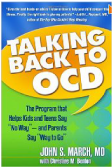 |
Topic: Obsessive Compulsive Disorder
 March, John S., MD, MPH, Talking Back to OCD: The Program That Helps Kids and Teens Say "No Way" -- and Parents Say "Way to Go," New York: Guilford Press, 2007.
March, John S., MD, MPH, Talking Back to OCD: The Program That Helps Kids and Teens Say "No Way" -- and Parents Say "Way to Go," New York: Guilford Press, 2007.
No one wants to get rid of obsessive-compulsive disorder more than someone who has it. That's why Talking Back to OCD puts kids and teens in charge. Dr. John March's eight-step program has already helped thousands of young people show the disorder that it doesn't call the shots--they do. This uniquely designed volume is really two books in one. Each chapter begins with a section that helps young readers zero in on specific problems and develop skills they can use to tune out obsessions and resist compulsions. Dr. March demonstrates how to, create a nickname for the illness to remember that OCD isn't you, make a symptom chart so you can plan when and where to start talking back, and break the disorder's rules about the rituals. The pages that follow the instructions for kids and teens show their parents how to be supportive without getting in the way. After just a few months' practice, your family will get back to spending time on things that matter, instead of following pointless orders from the illness. The next time OCD butts in, you'll be prepared to boss back--and show an unwelcome visitor to the door. |
 |
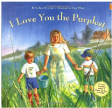 |
Topic: Children's Stories
 Joosse, Barbara M. & Mary Whyte, I Love You the Purplest, San Francisco: Chronicle Books, 1996.
Joosse, Barbara M. & Mary Whyte, I Love You the Purplest, San Francisco: Chronicle Books, 1996.
Early in the evening two young brothers and their mama finish supper in the sturdy red cabin and set out to fish. While digging for worms, rowing the boat and pulling in fish, each brother asks his mama which one is the best at each task and, as they are being tucked into bed, which one she loves the best. Barbara Joosse's heartwarming text is beautifully complimented by Mary Whyte's engaging watercolor illustrations. Readers will delight in the tender message that every child holds a special place in a parent's heart.
|
 |
|
|
|
| |
 |
 |
|
|
| |